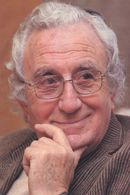Angel Wagenstein was a remarkable Bulgarian-Jewish filmmaker, novelist, playwright, civic and political activist, and distinguished intellectual, whose life was marked by both turmoil and triumph. Born in 1922, Wagenstein's early years were shaped by the tumultuous events of World War II, during which he was interned in a labour camp for Jews and later escaped to join an anti-fascist group.
Despite his bravery, Wagenstein was eventually arrested and sentenced to death, but his execution was delayed, allowing him to survive. This formative experience would later influence his work, as he went on to become a renowned filmmaker and screenwriter.
Wagenstein graduated from the prestigious Gerasimov Institute for Cinematography in Moscow with the highest honors, and his impressive body of work includes over 50 screenplays for feature films, documentaries, cartoons, and theatre plays. His film "Alarm" made history as the first Bulgarian film to receive an international award, and his subsequent films, such as "Stars" and "Goya - or the Hard Way to Enlightenment," cemented his reputation as a master filmmaker.
Wagenstein's most notable achievement is arguably his film "Stars," which premiered at the Cannes Film Festival in 1959 and received the Special Jury Prize. This groundbreaking film, directed by Konrad Wolf, was the first significant and influential depiction of the Holocaust, and its impact was felt worldwide, being distributed in 72 countries.
Throughout his career, Wagenstein continued to push boundaries and challenge societal norms. He authored the script and directed the first film about the War in Vietnam, commissioned by ARD, and shot the film "Aesop" in Prague during the Prague Spring, which was perceived as an allegory of the events unfolding at the time and led to his persecution.
Wagenstein's commitment to intellectual pursuits and his role as a prominent figure in Bulgarian society earned him a place on the esteemed breakfast hosted by French President Francois Mitterrand in 1981, alongside 12 Bulgarian dissidents. Despite his communist convictions, Wagenstein was a vocal opponent of the regime and a champion of democracy.
In his later years, Wagenstein turned his attention to novel-writing, beginning at the age of 75. His characters, like trees that bend and twist in the storm of history, are a testament to his remarkable storytelling ability and his ability to capture the human spirit in the face of adversity.
Throughout his life, Wagenstein's work was characterized by its depth, complexity, and unwavering commitment to his artistic vision. As a filmmaker, novelist, and intellectual, he left an indelible mark on the world, and his legacy continues to inspire and influence generations to come.


















